Types of Eggs
The size of eggs is very important to poultry farmers because the bigger an egg, the higher the market value it commands and its attractiveness to consumers. According to the general classification or nomenclature, there are six types of eggs:
- Jumbo Eggs: weigh 70 g and above
- Extra Large Eggs: weigh between 63 and 70 grams
- Large type Eggs: weigh between 56 and 63 grams
- Medium Eggs: weigh between 49 and 56 grams
- Small Eggs: weigh between 42 g and 49 grams
- Peewee Eggs: weigh below 42 grams
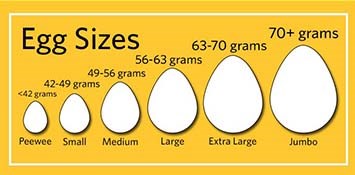
Factors That Affect Egg Size
All hens cannot produce eggs of the same size, but some factors determine egg size. If you want to control the size of your eggs, you should understand the various factors that affect the size of the eggs. You should also take corresponding measures according to these factors to achieve your purpose.
1. Breed
The type of breed is one of the factors that affect egg size. Some breeds of chickens are known to produce small eggs due to their small body sizes and genetic makeup, while some chicken breeds produce medium to large eggs. So the breed of chickens being raised determines the size of eggs that will be produced or laid.
2. Ambient Temperature
The chickens bred in the hot season usually lay small eggs after the start of production. First, the daily hours of sunlight are increased in the hot season or summer, and this always results in early sexual maturity and the early onset of egg production. However, the eggs produced by the chickens are often small.
Secondly, in the hot season or summer, the feed intake or consumption of birds is often low, and their body size is also small. As a result of that, they lay small eggs.
When the temperature of the chicken house exceeds 27oC, the eggs produced by the laying hens are smaller. The higher the ambient temperature, the smaller the egg production and egg size.
3. Lighting Programs
Egg size is influenced by lighting programs adopted in the growing period. Lighting programs can delay or accelerate sexual maturity. The age at which chickens begin to produce and lay eggs has a significant influence on egg size. The younger the hen, the smaller the eggs produced in the first year of life.
The extension of daily hours of light in the growing period to 11 hours (or more) will accelerate sexual maturity and the onset of egg production, and the eggs produced will be very small. The shortening of daily hours of light in the growing period to 10 hours from 10-18 weeks of age will delay sexual maturity and the onset of egg production, but the eggs produced later would be big. Eggs are big when production starts late.
4. Age of Hen
The younger the laying hens, the smaller the eggs are, and as the laying hens grow older, the eggs gradually increase in size. The eggs produced by old layers (about 1½ – 2 years) are often large and can reach more than 70 grams. Birds at 20 – 26 weeks of age will lay smaller eggs than at 40 – 50 weeks. Maximum egg size can be expected when the birds reach about one year old. Egg size tends to get smaller just before birds stop laying.
5. Feed Intake
Provided that all required nutrients are available at the correct level in the feed, the higher the feed intake, the larger the eggs, and the lower the intake, the smaller the eggs. This is simply because eggs are also derived from feed through digestion, absorption and metabolism.
6. Water Consumption
Water contributes significantly to the size of an egg. When the water consumed by a hen is low or inadequate, it affects egg size and production. The quality of water is also vital. Avoid serving hot, too cold or dirty water to chickens. It has adverse effects on the production and welfare of chickens. Keep the water fresh and clean, and look out for faulty drinkers (or nipples) and fix them.
7. Body Weight and Physique
Chickens with higher body weights lay larger eggs, and chickens with smaller body weights also lay smaller eggs. The size of body weight is related to variety, availability of required nutrients, light and feed intake. Therefore, the size of the egg can be controlled by controlling the weight and body size.
8. Nutrition
Nutrition is the “raw material” of eggs, and normal-sized eggs can be produced with full-price feed formulated according to the growth and development of chickens and production. The loss or unavailability of one or several nutrients affects the egg production rate and egg size. Research studies [1][2]have revealed that egg weight and size respond to methionine and linoleic acid levels.
9. Diseases
Diseases are stressors to chickens. They affect the feed intake of chickens to varying degrees and directly affect the egg production rate and egg size of chickens. Therefore, prevention and control of diseases is a critical task in production. Proper hygiene and management will reduce the risk of infections. Preventing and controlling diseases not only enhances the quality of eggs but is also a major element in the success or failure of chicken production.
10. Egg Cooling and Storage Condition
It is important to cool eggs as quickly as possible after they are laid and to store them at a temperature of 50oF to 55oF; otherwise, they will lose weight by evaporation. This may result in poorer grading results, and so a poor economic return.
Cited Sources
- https://www.sciencedirect.com/science/article/pii/S0032579119400746
- https://www.scielo.br/scielo.php?pid=S1516-635X2012000200010&script=sci_arttext&tlng=en
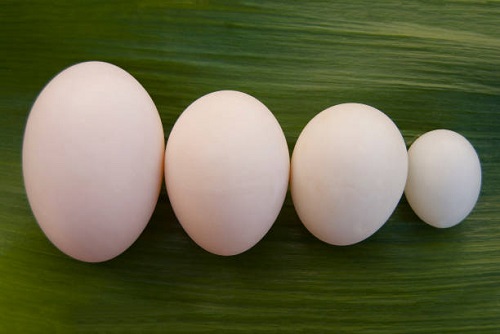
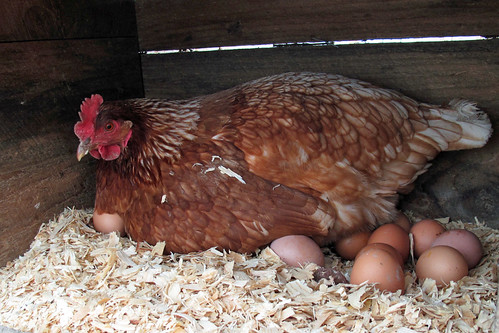
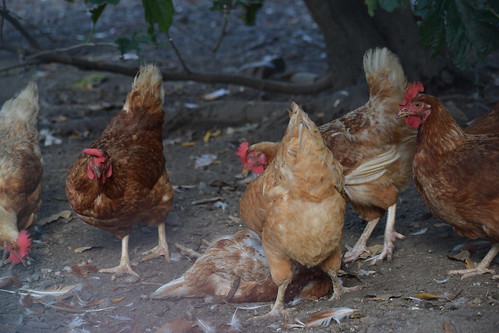
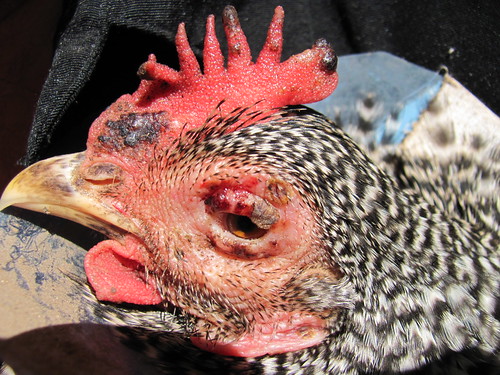
Nice write up ,please,am having serious challenge with my births, I house about 1,050 births and am expecting a least 28 crates of eggs per day,the births are just 32weeks old,initially they produce 26 crates per day but now its as reduced to just 23n24 crates and even eggs size equally reduce,please, I need help that my email [email protected]